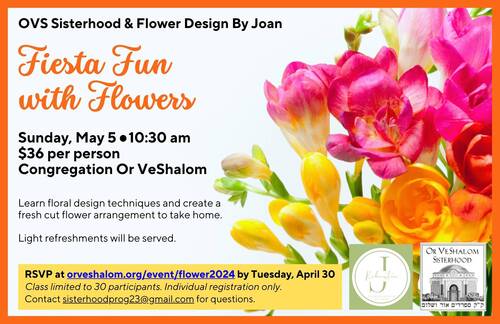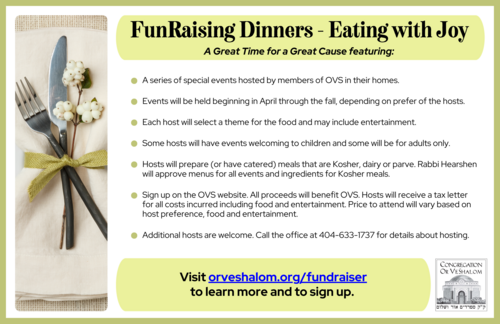-
Dec31
| Author | |
| Date Added | |
| Automatically create summary | |
| Summary |

Wed, April 24 2024
16 Nisan 5784
Worship Services
Coming Soon at OVS
All Events
-
Sunday ,
MayMay 5 , 2024Sisterhood Fiesta Fun with Flowers
Sunday, May 5th 10:30a to 12:00p
Learn floral design techniques and create a fresh cut flower arrangement to take home. Limited to 30 people. Individual registration only. -
Sunday ,
MayMay 5 , 2024FunRaising Dinner - Bob and Dale Israel
Sunday, May 5th 6:00p to 8:00p
Join us for dinner hosted by OVS members Bob and Dale Israel. All proceeds benefit OVS. -
Sunday ,
MayMay 5 , 2024FunRaising Dinner - Rabbi and Carrie Hearshen
Sunday, May 5th 6:00p to 8:00p
Join us for dinner hosted by Rabbi and Carrie Hearshen. Rabbi Hearshen will prepare his famous BBQ! All proceeds benefit OVS. -
Sunday ,
AugAugust 11 , 2024FunRaising Dinner - Clare and Robert Habif
Sunday, Aug 11th 6:30p to 8:30p
Join us for a Cuban dinner hosted by Clare and Robert Habif. All proceeds benefit OVS.
Burekas & Biscochos
The Sephardic Cooks
My Preferences for Contact
Today's Sefirah Count Is 1
| היום יום אחד לעמר |
Today's Calendar
| Pesach |
| Hebrew for Dummies (scroll down to register) : 7:00pm |
| Prayerbook 101 (scroll down to register) : 8:00pm |
| Havdalah : 8:52pm |
Candle Lighting
| Friday, Apr 26, 7:59pm |
Havdalah
| Wednesday, Apr 24, 8:52pm |
Pesach
| Wednesday, Apr 24 |
OVS Feature Video
Wed, April 24 2024 16 Nisan 5784



